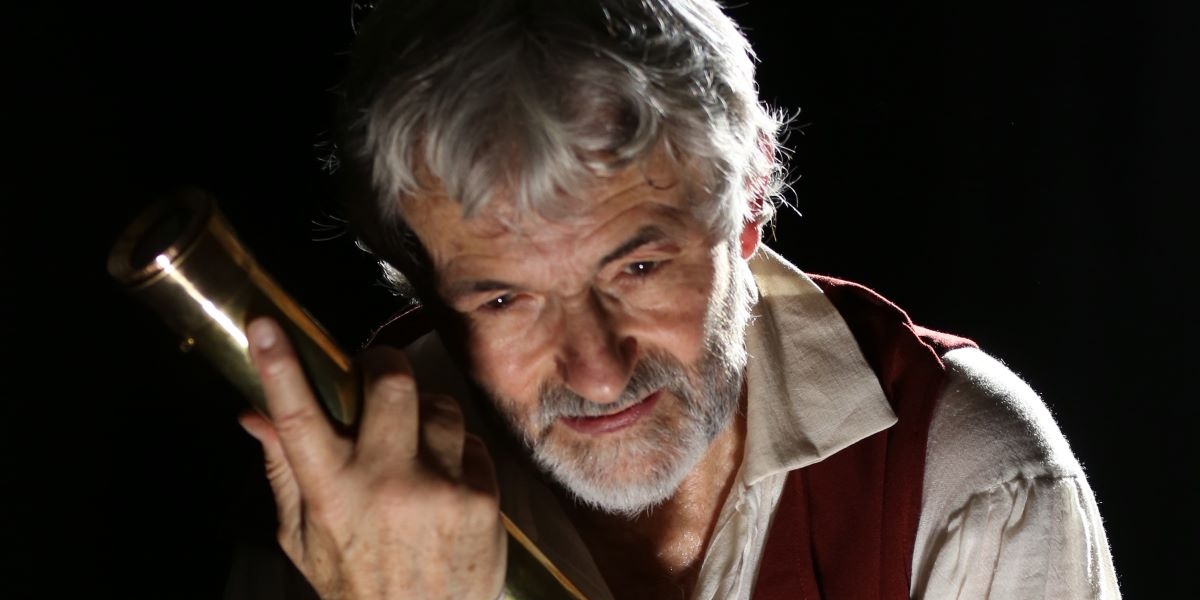How apt that this fascinating play about Galileo’s 1633 trial, is performed in this theatre. The Old Red Lion pub, a one-minute walk from Angel tube, is one of the oldest in London, built in 1415. People were drinking here at the time of the trial.
Nic Young’s perceptive play starts at the end of the story – when sentence is passed following the trial. Galileo is found guilty of being’ vehemently suspect of heresy’, put under house arrest (at the age of 70) and banned from further publication. The script is at times witty, horrific, compelling, but at the same time makes complex scientific theories understandable, assisted by Lou Yates’ drawings. This show was justifiably a sell-out in 2023 Edinburgh Fringe. Brecht’s play on Galileo is heavy in contrast. This set is simple with a telescope, table, chair and papers with Hardy in 17th century costume.
Galileo Galilei (1564-1642), born in Pisa, was an astronomer, physicist and engineer, under the patronage of Cosimo de Medici of Florence.
At the time, Catholics believed that God created earth, and the solar system revolved around it. Copernicus’ theory of heliocentrism where the earth revolved around the sun daily, was heresy in the eyes of the church.
Galileo developed the telescope by making his own lenses up to a magnification of x32, enabling him to study the stars in more detail than anyone before him. He was the first human to see the moon, the four moons around Jupiter (called the Galilean moons), and also to prove Copernicus’ heretical theory. He felt ‘the entire universe had funnelled itself through the tiny eyepiece’.
His book ‘Dialogue Concerning the Two Chief World Systems (Dialogo sopra i due massimi sistemi del mondo)[1632] explaining his proof, put him into the cross-hairs of the Catholic Church. He was summoned by the Inquisition to Rome to face trial as a heretic. Even Cosimo Medici’s brilliant lawyers could not save him.
We go back in time to various scenes in his life, his meeting with treacherous Pope Urban (who seemingly agreed that he write the book of philosophical debate and suggested the title), and his trial. The trial, conducted in Latin, was a stitch-up. He was found guilty on forged evidence (an edict amending another papal edict which predated the edict it was intended to amend). He was threatened with torture. Galileo describes what happens under the rack; when you are torn cartilage by cartilage, you will confess to anything. The outcome is always the same, you resist if you can, you die. Pragmatically he recants his theories to live. 400 years later, with religious fanaticism, nothing much has changed. The book, published in Italian not Latin, allowed the ordinary man to read it. He knew it had already been printed and sold outside Italy so his word was out anyway, despite the recantation.
This 70 minute one-man-show depends on Tim Hardy as Galileo (and the Pope, Cosimo’s lawyer and the judge). Hardy gives a mesmerising tour-de-force performance, so easily switching characters, that one forgets there is only one person on stage. The intimacy of the theatre allows him to draw the audience in; we are his friends, his co-conspirators, hanging on every nugget of his wisdom. After he recants, his mischievously twinkling eyes turn to us whispering – ‘the world still turns!’
Hardy is gifted with a wonderful sonorous speaking voice, which enables him to inhabit these characters effortlessly. His voice has perfect resonance; I can hear he would make a natural bass-baritone. To my surprise on seeing Hardy’s past works, he has made opera appearances for the Opera Company Music Theatre London.
Catch this while you can and absorb the history with a drink in the pub downstairs.

